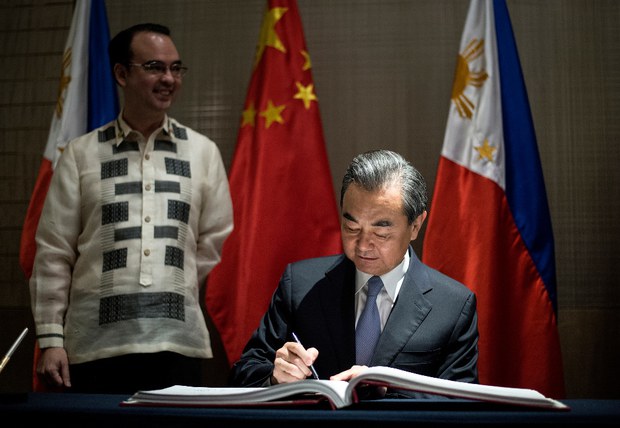Chinese Official Warns Outsiders Against Meddling in South China Sea
2017.07.25
Manila
 Chinese Foreign Minister Wang Yi signs a guestbook during his meeting with Philippine Foreign Affairs Secretary Alan Peter Cayetano in Manila, July 25, 2017.
Chinese Foreign Minister Wang Yi signs a guestbook during his meeting with Philippine Foreign Affairs Secretary Alan Peter Cayetano in Manila, July 25, 2017.
During a two-day visit to the Philippines, the Chinese foreign minister on Tuesday warned outside forces against instigating trouble in the South China Sea, weeks after the United States conducted “freedom of navigation” patrols in the territorially contested region.
Chinese Foreign Minister Wang Yi issued the statement after a brief meeting in Manila with his Filipino counterpart, Alan Peter Cayetano, in which both men agreed to boost bilateral cooperation on a host of issues.
China, along with the Philippines and the rest of the 10-member Association of Southeast Asian Nations bloc, “have full capability and wisdom to handle differences between us and maintain stability” in the South China Sea, Wang said.
“If there are still non-regional forces or forces in the region, they don’t want to see stability in the South China Sea, and they want to stir up trouble in the South China Sea,” Wang told reporters. “We need to stand together and say no to them together.”
The statement came after a U.S. Navy ship earlier this month sailed near an artificial island constructed by China, an incident that Beijing protested as an unauthorized entry into its waters.
The USS Stethem mission was the second “freedom of navigation operation” carried out under President Donald Trump. The guided missile destroyer sailed near the Paracel Islands, a region claimed by the Philippines along with China, Taiwan and Vietnam.
Also last week, Australian Foreign Minister Julie Bishop challenged China’s efforts to build artificial islands the South China Sea while Beijing claimed publicly claimed that it wanted to maintain peace in the maritime region.
Cooperation is increasing
Wang insisted that a regional code of conduct, which governs claims in the mineral-rich region, already was taking shape and the region was trending toward stability.
“Markedly, cooperation is rising and positive elements are increasing,” he said. “Improvement of the China-Philippine relationship has played a key role in this process.”
His statement followed a bilateral agreement in May where Manila and Beijing pledged to boost cooperation and find ways to strengthen trust and confidence in the sea region. A major portion of the world’s trade passes through the South China Sea.
Philippine President Rodrigo Duterte has made improving bilateral relations with China a centerpiece of his year-old administration.
Duterte’s moves follow a 2016 ruling by a United Nations-backed tribunal that went in favor of Manila against Beijing’s sweeping claims over the sea region, a decision China criticized as flawed even as the international community hailed it as a victory for the Philippines.
The case was filed by the previous government of Benigno Aquino III in 2013 at the Permanent Court of Arbitration in The Hague after Chinese ships were spotted in Scarborough Shoal, a traditional fishing area for Filipinos. The area consists of rocks and shoals and is about 200 km (125 miles) from the main Philippine island of Luzon.
On Tuesday, Cayetano said Wang’s trip to Manila was part of ongoing efforts to strengthen bilateral relations after Duterte made two visits to China in the span of a year.
He reiterated the standing invitation for Chinese leader Xi Jinping to visit the Philippines.
Warning
Duterte previously said he wanted to enforce the ruling in The Hague and conduct exploration activities in the South China Sea, claiming he had informed his Chinese counterpart of his intention. But Xi instead warned him of war if he insisted, according to Duterte.
Wang did not comment on Xi’s alleged warning and said Beijing was fully committed to supporting the “strong momentum of the improvement and growth of the relationship” of the two countries.
He said Duterte, in his annual state of the nation speech on Monday, underscored the growth of the relationship through bilateral cooperation and dialogue.
“China is ready to be the Philippines’ most sincere and longstanding cooperation partner in your journey of national development,” Wang said.
He noted Duterte’s independent foreign policy focuses on efforts at weaning the Philippines away from its traditional allies, a move that could lead to brighter cooperation prospects with other countries.







